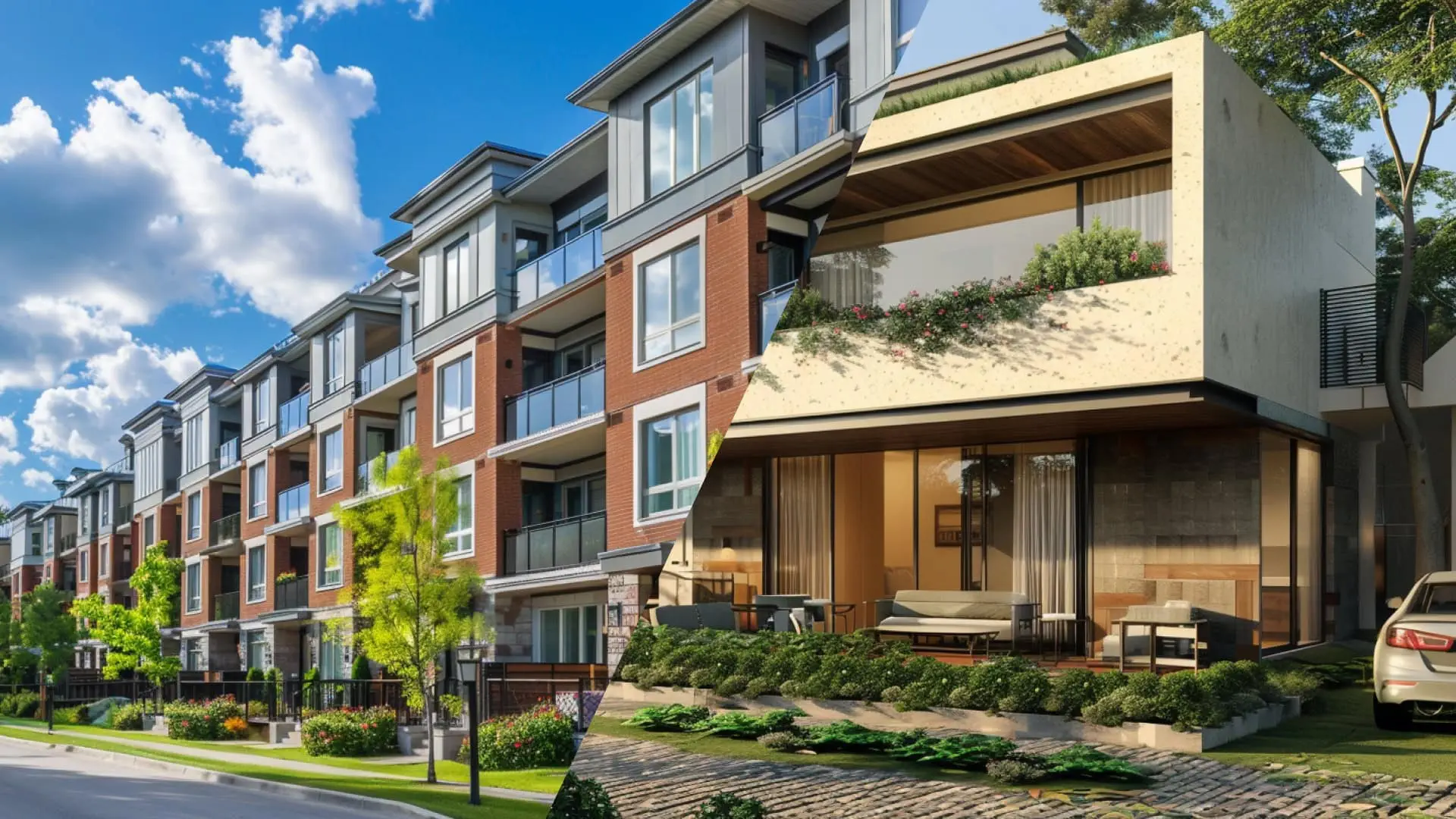
Wondering what is a townhouse vs duplex? This guide will compare their structures, community dynamics, and costs to help you decide which fits your lifestyle and financial goals. Let’s explore the key differences.
Dive into the world of real estate where the choice between a townhouse and a duplex isn’t just about the number of walls you share with your neighbors. It’s about the rhythm of your daily life, the aspirations for your family’s future, and the vision for your financial growth. Consider this your roadmap to understanding the structural symphony and fiscal finesse of these abodes.
From the private entrances of a duplex that whisper exclusivity to the warm embrace of townhouse communities that echo togetherness, we’ll navigate through living spaces, yard dreams, and the fine print of ownership to ensure your decision is as informed as it is intuitive.
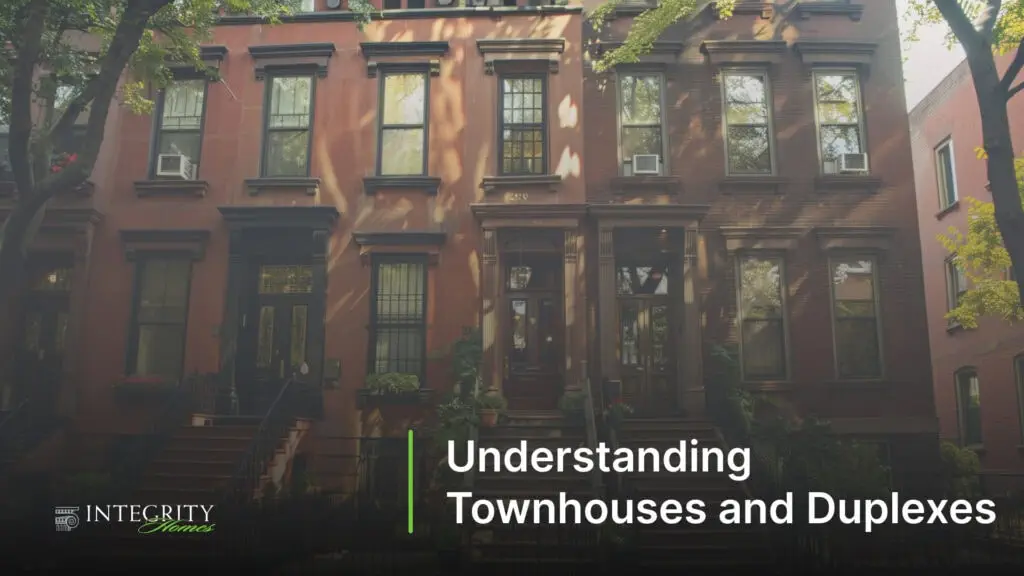
At first glance, townhouses and duplexes might seem like close kin in the housing family. However, their differences are as pronounced as the unique lifestyles they accommodate. Grappling with these housing forms means understanding their distinct architecture, ownership models, and community dynamics.
A townhouse is to a row of books on a shelf as a duplex is to a pair of standalone volumes, each with its own cover and story. Whether you’re drawn to the collective spirit of townhouse living or the autonomous allure of a duplex, there’s a space that not only fits your needs but also complements your way of life.
A townhouse stands tall and proud, a multi-level abode neatly aligned with its brethren in a communal setting often governed by a homeowners association. It’s where traditional single-family homes meet modern convenience, offering a slice of suburbia without the extensive yard work of a single family home.
Picture a living space that stretches skyward, not sideways, with shared walls that hold together a tapestry of lives. Townhouse communities are more than a collection of homes; they’re a nexus of shared experiences, where amenities like swimming pools and playgrounds become the backdrop for family memories.
A duplex, on the other hand, is an intimate dance of two separate living units within a single structure, each with its own entrance and complete living amenities. These separate units, also known as two separate units, are the architectural embodiment of closeness and independence, where you might share a wall but not your sanctuary.
The duplex home offers a unique investment proposition: the chance to inhabit one unit while the other becomes a source of rental income, a potential financial boon for savvy homeowners. It’s a space that accommodates life’s complexities, from extended family to the ebb and flow of tenants.
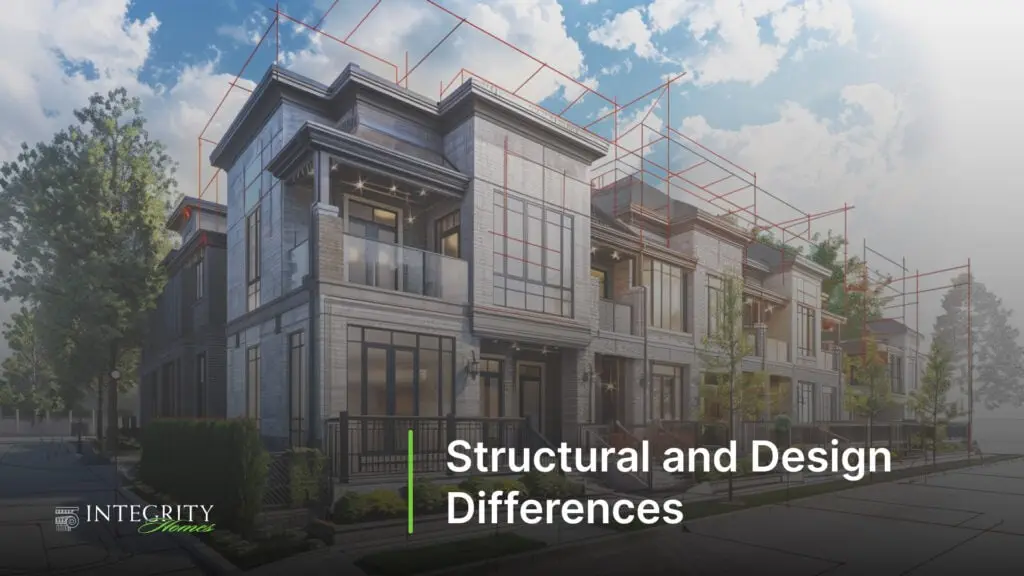
When the blueprints come to life, the structural heartbeats of townhouses and duplexes reveal their true character. Townhouses, akin to a string of pearls, are connected, each unit a bead in the necklace of the neighborhood. Duplexes, conversely, are more like a pair of adjacent books on a shelf, sharing a spine but opening to different pages. Both offer unique living experiences, but it’s the nuances of their designs—from the layout of rooms to the patch of green you call your yard—that make them stand apart in the housing landscape.
Step inside a townhouse and you’ll find a vertical expanse of living space, where family life is spread across multiple stories, each with its own purpose. The tall and slender structure promotes a sense of coziness without confinement, with a layout that often includes communal areas on the ground floor and private quarters above.
Duplexes, with their broader stance, offer a layout that feels more akin to traditional single-family homes. With only one shared wall, duplexes afford more windows, doors, and often a sense of solitude that’s harder to find in the closer quarters of townhouse living.
Beyond the walls, the outdoor realm of these homes diverges further. Townhouses, with their tidy front stoops and modest backyards, offer a pinpoint of personal outdoor space without the sprawl of a suburban lawn. Duplexes, conversely, boast a more generous share of the great outdoors, often with their own yard space that wraps around the home, offering space for gardens, playsets, or simply the joy of a larger buffer between you and the world.
While townhouse owners might enjoy a deck with a view, duplex dwellers often have the luxury of grounding their feet in a patch of earth they can call their own.
The shared wall is where the paths of townhouses and duplexes converge, yet even here, their journeys differ. In a townhouse, one or more walls on either side are a reminder of the community pulse, a symphony of lives lived in proximity. Duplexes offer a duet instead, with one wall that promises a quieter coexistence.
Modern materials and construction techniques have risen to the challenge of privacy, ensuring that, regardless of the number of shared walls, the sanctity of home remains intact, cocooning residents in their personal havens.

The stewardship of a home is about more than just holding a set of keys; it’s about the responsibilities that come with them. For townhouse owners, this means managing both the interior heart of the home and its exterior skin, from the roof that shelters dreams to the slice of land that anchors them.
Duplex owners, conversely, often navigate the waters of property maintenance solo, without the guiding hand of a homeowners association but with the freedom to chart their own course.
In the world of townhouses, the homeowners association stands as a sentinel, overseeing the harmony of the community’s aesthetic and the smooth operation of shared services. From manicured lawns to sparkling pools, the HOA ensures that common areas reflect the collective pride of the residents. It’s a partnership that simplifies the homeowner’s responsibilities but also requires adherence to communal rules.
The monthly dues paid to the HOA are the price of convenience, contributing to a landscape where the burdens of upkeep are shared, much like the walls themselves.
For the duplex owner, the story is one of autonomy. Without an HOA to navigate, maintenance falls squarely on their shoulders, from the seasonal rhythms of yard care to the unexpected surprises that homes often present. It’s a hands-on experience that mirrors the independence of the living arrangement itself.
This DIY approach to exterior maintenance and property maintenance offers a deeper connection to the home, but it also demands a readiness to invest time, effort, and resources into preserving its value and functionality.

The financial fabric of home ownership weaves through purchase prices, potential rental income, and the long-term tapestry of investment value. In this realm, duplexes often command a higher initial investment but sing a siren song of rental opportunities, while townhouses court the budget-conscious with their typically lower entry points. Understanding these financial nuances is key to choosing a home that not only fits your lifestyle but also aligns with your economic aspirations.
The price tag dangling from the front door of a potential home is often the first number to crunch. Townhouses, with their shared infrastructure and smaller lots, generally beckon with more modest asking prices. Duplexes, offering a double dose of living space and the land to match, may come with a heftier initial cost.
Yet, the true measure of value extends beyond the purchase price to the potential each home holds within its walls.
The allure of a duplex often lies in its dual nature, offering not just a home, but an income-producing asset. With the ability to host tenants in one unit while residing in the other, duplex owners can offset mortgage payments with rental checks.
Townhouses, typically designed for single-family occupancy, don’t typically offer this same revenue stream. For those with a landlord’s spirit, a duplex might not only be a home but also a stepping stone to financial freedom.
When the future comes into focus, investment value takes the stage. Townhouses, riding the waves of market demand, especially in high-density areas, have the potential to appreciate gracefully over time. Duplexes, with their rental income potential, offer a robust investment proposition, cushioning owners against market fluctuations and providing ongoing cash flow.
The investment value of a home is not just in its resale price but in the financial flexibility it affords over the years.
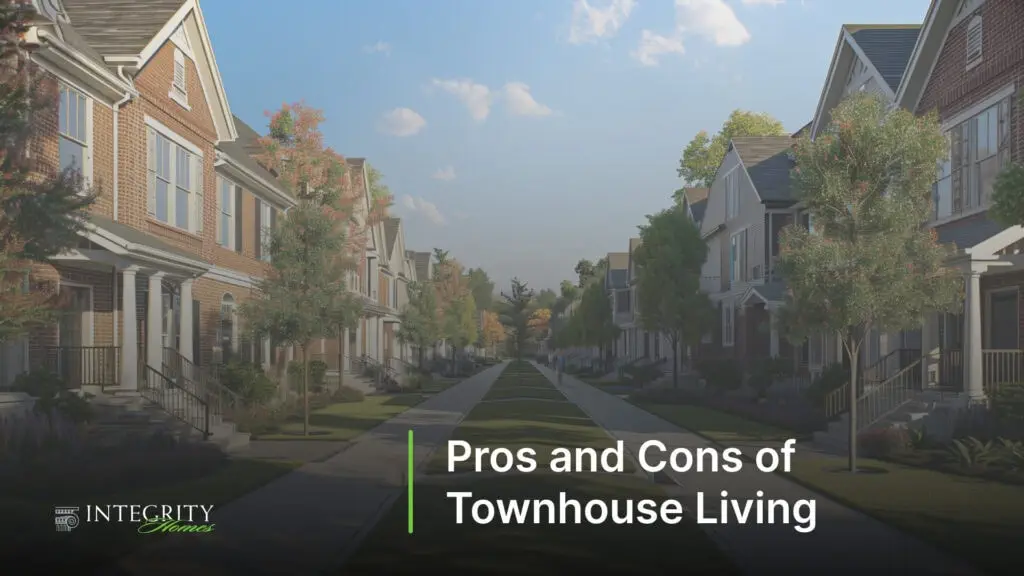
The townhouse lifestyle is an intricate mosaic of communal living and personal space. Its affordability is a beacon for first-time buyers, and the shared amenities—a pool to cool off in or trails to wander—add to the quality of life without the heavy lifting of maintenance. Yet, this comes at the cost of privacy, with shared walls sometimes thinning the veil between households. The HOA, for all its benefits, can also be a stern gatekeeper, enforcing community standards that might not always align with personal tastes.
Conversely, the very structure of a townhouse, with its multiple floors and compact living areas, can present a vertical challenge, especially for those who prefer sprawling, single-story spaces. The proximity to neighbors, though fostering a sense of community, can also mean a closer encounter with their daily lives. The balance of townhouse living is one of shared experiences and individual compromises, crafting a lifestyle that’s as much about the collective as it is about the individual.
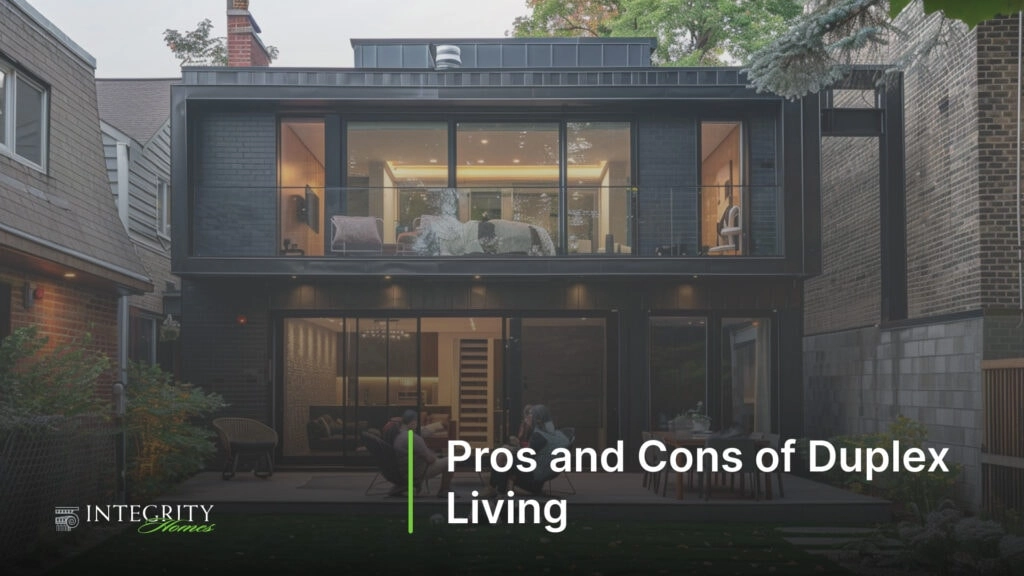
The duplex sings a different tune, one of privacy and autonomy. With only one shared wall and a separate entrance, duplex living provides a sense of seclusion that’s rare in denser housing options. The possibility of rental income is a financial melody that resonates with those looking to diversify their revenue streams. The additional living space and the charm of residential neighborhoods offer a retreat from the urban hustle. Yet, this independence comes with strings attached—the solo act of maintenance and the absence of communal amenities can be significant considerations.
While a duplex might lack the built-in social network of a townhouse community, it compensates with a quieter setting and more space to cultivate a private oasis. The potential to live alongside family or friends in the adjoining unit can bring loved ones closer, literally and figuratively. However, shared areas such as driveways and laundry facilities might require a harmonious duet with your neighbor.
Duplex living is a balance of privacy and partnership, offering a unique blend of solitude and sociability.
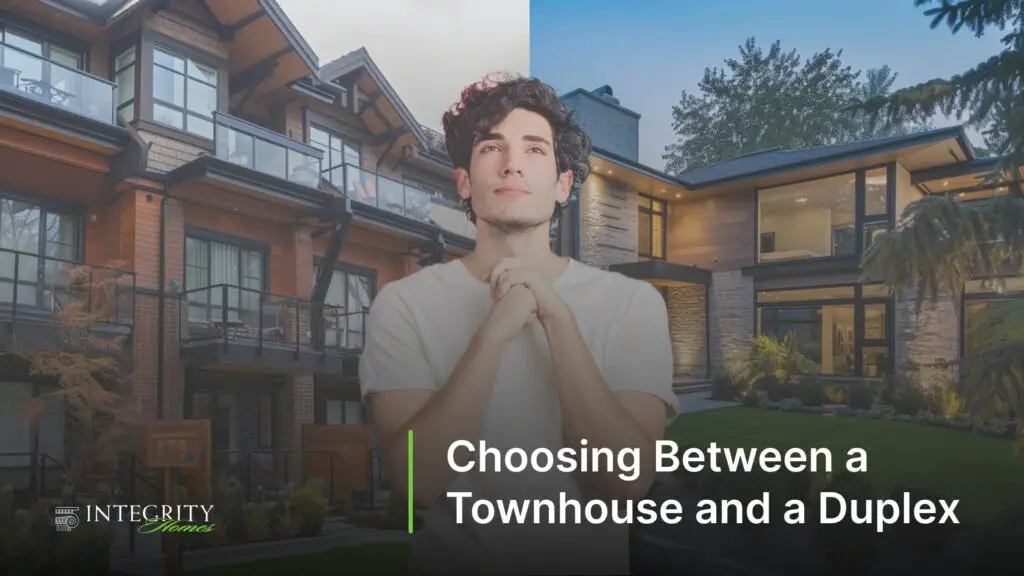
The decision between planting roots in a townhouse or a duplex hinges on more than just preference—it’s a reflection of your lifestyle, financial goals, and visions for the years ahead. Whether you’re drawn to the vibrant tapestry of townhouse communities or the independence and investment allure of a duplex, it’s essential to weigh the scales of desires against practicalities.
As we explore these considerations further, let’s keep in mind that the perfect home isn’t just about the here and now, but also about setting the stage for the life you aspire to lead.
Your lifestyle is a canvas, and your choice of home is one of the most vibrant strokes you’ll paint upon it. Townhouses offer a sense of community and convenience, with shared amenities that extend your living space beyond its walls. Duplexes, with their inherent privacy and potential for rental income, cater to those who seek a buffer from the bustle and an opportunity to capitalize on their investment.
As you weigh these options, consider how each aligns with your daily routine, social preferences, and the kind of environment you wish to foster for yourself and your loved ones.
The financial contours of your life shape the home you can afford and the one that can afford you opportunities. Duplexes, with their higher purchase price, demand a more substantial upfront investment but promise a return through rental income. Townhouses, often more affordable, offer a cost-effective path to homeownership, with HOA fees that streamline maintenance costs.
Your budget and financial goals will guide you toward the choice that not only fits your wallet but also supports your economic aspirations, whether that’s immediate affordability or the promise of future cash flow.
Envisioning the years ahead is crucial when selecting between a townhouse and a duplex. Are you planning for a growing family, or are you setting the stage for a profitable investment? A townhouse in a planned unit development might be the perfect backdrop for family milestones, while a duplex could align with your goals of building wealth through real estate. Consider how your long-term plans dovetail with the characteristics of each housing type, and let that foresight illuminate the path to your ideal home.
In this journey through the realms of townhouse and duplex living, we’ve navigated the structural nuances, the responsibilities of ownership, and the financial implications that shape these distinctive lifestyles. Townhouses beckon with their community spirit and ease of maintenance, while duplexes appeal with their autonomy and income-generating potential. As you stand at the crossroads, reflect on the pros and cons, the shared walls and the private yards, and the visions of your future self. May the insights shared here light your path to a home that resonates with your life’s melody, a sanctuary where every corner echoes with the joy of living.
The main differences between a townhouse and a duplex lie in their structure and governance. A townhouse is part of a multi-story community with shared walls and a homeowners association, while a duplex is a single structure divided into two living units with separate entrances and no community governance.
You can expect more privacy in a duplex compared to a townhouse, as the former usually has only one shared wall and more outdoor space, providing a greater sense of privacy.
Yes, choosing a duplex over a townhouse can provide financial benefits such as potential rental income, which can help offset mortgage costs and generate additional cash flow.
As a townhouse owner, you can expect to be responsible for both the interior and exterior of your unit. However, homeowners association fees often cover common area maintenance and shared amenities, which can help reduce your individual maintenance burden.
It ultimately depends on market demand, location, and property maintenance, but duplexes may offer additional investment value through rental income.
Maryland | Frederick, MD | National Harbor, MD | Potomac, MD
Virginia | Alexandria, VA | Fairfax, VA | Lorton, VA | Northern, VA | Stafford, VA | Stephenson, VA | Winchester, VA | Washington DC